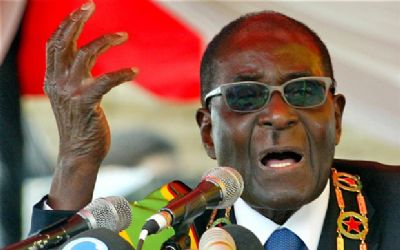The UN has just elected several notorious human rights abusers to serve a 3-year term on its body charged with promoting human rights and fundamental freedoms - the Economic and Social Council (ECOSOC).
The ECOSOC is one of six principal UN organs and consists of 54 UN members elected by the General Assembly. Its job is to "make or initiate studies and reports with respect to international economic, social, cultural, educational, health, and related matters" as well as "make recommendations for the purpose of promoting respect for, and observance of, human rights and fundamental freedoms for all."
On October 29, 2014 the General Assembly held elections for 18 new members and chose such paragons of human rights as Zimbabwe (received 178 votes of 193 UN members, the same number as France and Germany), Mauritania (177 votes), Pakistan (181 votes) and Uganda (181 votes). Here are are some examples of how new ECOSOC members have been "promoting respect for, and observance of, human rights and fundamental freedoms for all" so far.
In Zimbabwe "Security forces committed human rights abuses. The most important human rights problems remained the government's targeting for torture, abuse, arrest, and harassment of members of non-ZANU-PF [Mugabe's Zimbabwe African National Union-Patriotic Front] parties and civil society activists ... Executive influence and interference in the judiciary continued, and the government infringed on citizens' privacy rights ... Authorities restricted freedoms of speech, press, assembly, association, and movement. The government continued to evict citizens, invade farms, private businesses and properties, and demolish informal marketplaces. The government impeded nongovernmental organization (NGO) efforts to assist those displaced and other vulnerable populations. The government arrested, detained, prosecuted, and harassed NGO members. Government corruption remained widespread, including at the local level. Violence and discrimination against women; child abuse; trafficking of women and children; and discrimination against persons with disabilities, racial and ethnic minorities, lesbian, gay, bisexual, and transgender (LGBT) persons, and persons with HIV/AIDS were problems." (US State Department's Country Report on Human Rights Practices 2013, Zimbabwe)
In Mauritania "The central human rights problems were the use of torture by police to extract confessions, continuing slavery and slavery-related practices, and trafficking in persons. Other reported human rights problems included harsh prison conditions, abusive treatment in detention facilities, arbitrary arrests, and lengthy pretrial detention. Government influence over the judiciary, limits on freedom of assembly, restrictions on religious freedom for non-Muslims, and public corruption were problems... Rape was considered a serious problem... Families of the victim commonly reached an agreement with the rapist for monetary compensation...Human rights activists and lawyers reported that rape victims were stigmatized, persecuted, and even imprisoned. Domestic violence was a serious problem ... Child abuse occurred...child marriage was widespread... FGM/C [female genital mutilation/cutting] was practiced by all ethnic groups." (US State Department's Country Report on Human Rights Practices 2013, Mauritania)
In Pakistan "The most serious human rights problems were extrajudicial and targeted killings, sectarian violence, disappearances, and torture...Harassment of journalists, censorship, and self-censorship continued....Sectarian violence and discrimination against religious minorities continued. Corruption within the government and police was a persistent problem. Rape, domestic violence, sexual harassment, "honor" crimes, other harmful traditional practices, abuse, and discrimination against women and girls continued to be serious problems. Child abuse and commercial sexual exploitation of children persisted. Widespread human trafficking – including forced and bonded labor – remained a serious problem. Societal discrimination against national, ethnic, and racial minorities persisted, as did discrimination based on caste, sexual orientation, gender identity, and HIV status... Lack of government accountability remained a problem, and abuses often went unpunished, fostering a culture of impunity." (US State Department's Country Report on Human Rights Practices 2013, Pakistan)
In Uganda "the state security forces (SSF) committed human rights abuses. The three most serious human rights problems in the country were a lack of respect for the integrity of the person (including unlawful killings, torture, and other abuse of suspects and detainees); restrictions on civil liberties (including freedom of assembly, the media, and association); and violence and discrimination against marginalized groups, such as women (including female genital mutilation/cutting), children, persons with disabilities, and the lesbian, gay, bisexual and transgender (LGBT) community....Officials frequently engaged in corrupt practices with impunity... Rape remained a serious problem throughout the country...authorities did not investigate most cases... Domestic violence against women remained widespread... Child abuse remained a serious problem, particularly rape and sexual abuse of girls... Corporal punishment remained a problem in some schools and sometimes resulted in death...There were numerous reports of ritual sacrifice of children during the year." (US State Department's Country Report on Human Rights Practices 2013, Uganda)
October 29, 2014
UN elects Mugabe's Zimbabwe, slave bastion Mauritania, to serve 3-year terms on a top human rights body
Date
October 29, 2014
Title
General Assembly Elects 18 Members of Economic and Social Council, Confirms 13 States Nominated to Programme and Coordination Committee (press release), GA/11575
Original Source

